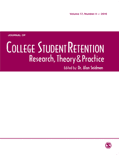
Journal of College Student Retention-Research Theory & Practice
Scope & Guideline
Empowering Educators with Insights on Retention
Introduction
Aims and Scopes
- Student Retention and Success:
The journal primarily addresses issues related to student retention and the factors influencing students' ability to persist through their college education. This includes exploring the reasons behind dropout rates and identifying strategies to enhance student success. - Diverse Student Populations:
A significant focus is placed on understanding the experiences of diverse student populations, including first-generation students, students of color, and those from low-income backgrounds. Research often highlights the unique challenges these groups face and the supports necessary for their success. - Impact of Psychological and Social Factors:
The journal examines how psychological traits, such as resilience, grit, and sense of belonging, influence academic performance and retention rates. Understanding these factors is crucial for developing interventions that support student well-being. - Educational Practices and Interventions:
Research published in the journal often evaluates educational practices, such as mentoring programs, academic advising, and community engagement initiatives, assessing their effectiveness in promoting student retention and success. - Role of Institutional Characteristics:
The journal investigates how institutional policies, practices, and environments impact student retention, focusing on aspects like financial aid, campus climate, and social integration.
Trending and Emerging
- Trauma-Informed Practices:
There is an increasing focus on trauma-informed practices within student affairs, recognizing the impact of adverse experiences on student well-being and academic success. This trend emphasizes the need for supportive environments that address mental health and emotional challenges. - Intersectionality in Student Experiences:
Research is increasingly exploring intersectionality, particularly how various aspects of identity (e.g., race, gender, socioeconomic status) intersect to affect students' college experiences and retention. This highlights the complexity of student needs and the importance of tailored support. - Impact of COVID-19 on Student Retention:
The journal has seen a rise in studies addressing the impact of the COVID-19 pandemic on student retention and success. This includes examining changes in enrollment patterns, mental health challenges, and the effectiveness of remote learning environments. - Data-Driven Approaches to Retention:
There is a growing trend towards utilizing data analytics and predictive modeling to understand and improve retention rates. This includes the use of educational data mining to identify at-risk students and implement targeted interventions. - Focus on Sense of Belonging:
Research on the sense of belonging and its correlation with student retention is gaining traction. This theme emphasizes the importance of social integration and community in fostering student persistence.
Declining or Waning
- Traditional Academic Support Services:
There appears to be a waning emphasis on traditional academic support services, such as tutoring and study skills workshops. Research increasingly focuses on holistic and integrated approaches to student support, rather than isolated services. - Generalized Student Engagement Strategies:
While student engagement is still a critical area of study, there is less emphasis on generalized engagement strategies. The trend is moving towards more tailored and context-specific engagement practices that consider the unique needs of diverse student populations. - Single-Factor Explanations for Retention:
Research that relies on single-factor explanations for student retention is becoming less common. The journal increasingly favors multi-faceted approaches that consider a broader range of influences on student persistence.
Similar Journals

International Journal of Educational Management
Fostering Knowledge for Strategic Educational PracticesInternational Journal of Educational Management, published by Emerald Group Publishing Ltd., stands as a premier platform for the dissemination of research in the fields of education and organizational behavior. With an ISSN of 0951-354X and an E-ISSN of 1758-6518, this journal has been at the forefront of academic inquiry since its inception in 1987 and continues to thrive with converged publication years extending to 2024. The journal is ranked in the Q2 quartile for both Education and Organizational Behavior and Human Resource Management as of 2023, highlighting its significant impact within these domains. Notably, its Scopus ranking places it within the top 20% of journals in Social Sciences - Education and the top 38% in Business Management and Accounting. With access options currently set to non-open access, the journal serves as a crucial resource for academicians, practitioners, and students seeking to enhance their understanding of effective educational management and its strategic implications. The commitment to advancing knowledge and practice makes the International Journal of Educational Management an essential citation for those dedicated to fostering excellence in educational environments.
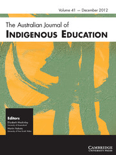
Australian Journal of Indigenous Education
Fostering Dialogue on Indigenous Education and CultureThe Australian Journal of Indigenous Education (ISSN: 1326-0111; E-ISSN: 2049-7784) is a premier platform for scholarly discourse in the fields of anthropology and education, published by the Aboriginal & Torres Strait Islander Studies Unit at the University of Queensland. With an impressive impact factor and recognized as a Q1 journal in Anthropology and Q2 in Education, it serves as a vital resource for researchers, professionals, and students interested in Indigenous education and cultural studies. Since becoming an Open Access journal in 2022, it has enhanced accessibility to critical research, facilitating broader engagement and knowledge sharing within the academic community. Covering a convergence period from 1996 to 2024, the journal is dedicated to advancing understanding and dialogue around Indigenous perspectives and methodologies, thereby contributing significantly to the body of knowledge in both anthropology and education. Its rankings in Scopus further affirm its commitment to excellence, making it an essential resource for those involved in the study and practice of Indigenous education across Australia and beyond.
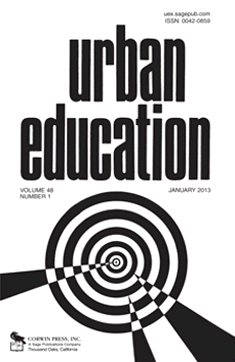
URBAN EDUCATION
Advancing Research for Urban Educational Excellence.URBAN EDUCATION, published by SAGE Publications Inc, stands at the forefront of the fields of education and urban studies. With a history dating back to 1965 and a converged publication reach extending to 2024, this journal plays a pivotal role in disseminating research that addresses the complexities of urban educational environments. Holding prestigious Q1 rankings in both education and urban studies categories, and boasting an impressive Scopus ranking, URBAN EDUCATION is recognized for its high impact on scholarly discourse and policy development. The journal aims to provide a platform for cutting-edge research that informs practice, enhances educational policy, and contributes to the improvement of educational outcomes in urban contexts. While it currently does not offer open access options, the rich content and critical insights produced within its pages remain invaluable to researchers, professionals, and students committed to addressing the myriad challenges in urban education.
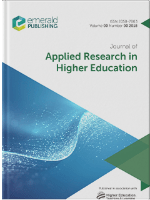
Journal of Applied Research in Higher Education
Empowering Educators with Evidence-Based InsightsJournal of Applied Research in Higher Education, published by EMERALD GROUP PUBLISHING LTD, is a pivotal resource in the field of education, with a particular focus on practical applications and research-driven insights in higher education settings. With an ISSN of 2050-7003 and an E-ISSN of 1758-1184, this journal has established itself as a respected outlet since its inception in 2009, demonstrating robust growth and academic rigor. Notable for its impressive Q2 ranking in the education category of Scopus and positioned in the 79th percentile among over 1500 journals in Social Sciences _ Education, it is a must-read for researchers, practitioners, and students who seek to explore innovative methodologies and contemporary challenges in higher education. While it does not currently offer open access, the journal features a range of insightful articles that contribute to the advancement of knowledge and practice in the sector, making it an essential tool for fostering educational improvement and policy development.
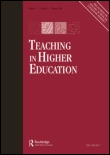
TEACHING IN HIGHER EDUCATION
Empowering educators through innovative teaching insights.TEACHING IN HIGHER EDUCATION is a premier academic journal published by Routledge Journals, Taylor & Francis Ltd, dedicated to advancing the scholarship and practice of teaching within the higher education sector. With an ISSN of 1356-2517 and an E-ISSN of 1470-1294, this journal is widely recognized for its profound impact in the field, boasting a 2023 category rank of Q1 in Education, placing it in the top tier of educational research. Its commitment to fostering an inclusive and dynamic discourse on pedagogical methods and learning frameworks makes it essential reading for researchers, educators, and policymakers alike. Spanning topics such as student engagement, curriculum development, and innovative teaching strategies, TEACHING IN HIGHER EDUCATION aims to contribute to ongoing conversations and practical applications that enhance the educational landscape. While an Open Access option is not available, the journal maintains a robust readership, with its articles being rigorously peer-reviewed and disseminated to reflect cutting-edge research trends and practices in education.

Journal of Student Financial Aid
Innovating Strategies for Accessible Higher EducationJournal of Student Financial Aid is a pivotal publication in the field of financial aid research and policy, published by the NATIONAL ASSOCIATION OF STUDENT FINANCIAL AID ADMINISTRATORS. This journal serves as a vital resource for scholars, practitioners, and policymakers alike, providing a platform for the dissemination of empirical studies, innovative practices, and critical discussions related to student financial aid. With a commitment to advancing knowledge and improving access to education through effective financial support strategies, the journal addresses key topics such as funding policies, student debt, access to higher education, and financial literacy. While it is not an open-access journal, it maintains a high standard for publication, ensuring that the research published is both rigorous and impactful. The Journal of Student Financial Aid plays a significant role in shaping the dialogue surrounding financial aid, making it an essential read for anyone invested in the future of educational equity and access.
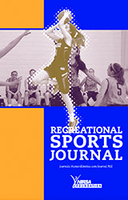
Recreational Sports Journal
Advancing Knowledge in Recreational Sports and EducationRecreational Sports Journal, a publication by SAGE Publications Inc, serves as a vital resource for scholars, professionals, and students interested in the multifaceted domains of recreational sports, leisure studies, and health education. With ISSN 1558-8661 and E-ISSN 1558-867X, this journal has made significant strides since its inception in 2002, maintaining an impressive presence through 2024. Recognized within its fields, it holds a Q3 category in both Education and Health (Social Science), along with a Q2 designation in Social Sciences (Miscellaneous), and notable rankings in Tourism, Leisure and Hospitality Management. As it provides a platform for scholarly articles and research that bridge theoretical frameworks with practical implications, the journal enriches the understanding of recreational sports' role in societal health and education. Though it does not currently offer open access options, its robust access and subscription model ensures that cutting-edge research reaches its audience efficiently. For those looking to enhance their academic pursuits in the recreational sports field, Recreational Sports Journal is an indispensable addition to any library.
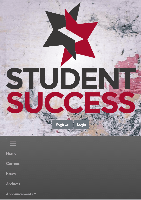
Student Success
Championing Success in Education.Student Success is a pioneering open-access journal published by Queensland University of Technology, focusing on the multifaceted aspects of education and success in academic settings. With its ISSN 2205-0795 and E-ISSN 2205-0795, this journal has been fostering innovative research and discussions since it opened its doors in 2015. Distributed from its base in Brisbane, Australia, it has established itself as a vital resource in the education sector, holding a respectable Q3 category rank in Education for 2023 and ranking #837 out of 1543 in the Scopus Social Sciences field. The journal's commitment to disseminating high-quality research aims to enhance the educational experience for students and professionals alike, making it a crucial platform for those dedicated to academic success. The open-access model ensures that cutting-edge research is accessible to a global audience, thereby enriching educational practices and outcomes worldwide.

Eurasian Journal of Educational Research
Elevating the discourse in educational research and policy.The Eurasian Journal of Educational Research, published by ANI YAYINCILIK, is a distinguished platform dedicated to advancing the field of education since its inception in 2008. Operating under a robust commitment to open access principles, this journal facilitates the dissemination of high-quality research and innovative practices across diverse educational domains. With an ISSN of 1302-597X and an E-ISSN of 2528-8911, it serves as a significant resource for educators, researchers, and policymakers within the academic community. Holding a Q3 rating in Education for the year 2023, and ranked 792 out of 1543 within the Scopus database, the journal exemplifies its commitment to enhancing educational outcomes across Eurasia. The Eurasian Journal of Educational Research aims to publish original research, systematic reviews, and insightful perspectives that contribute to the ongoing discourse in educational research, policy, and practice. Based in Ankara, Turkey, it also emphasizes the importance of regional studies and their implications on global educational trends, thus enriching the academic landscape with localized knowledge while fostering international collaborative networks.
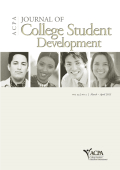
JOURNAL OF COLLEGE STUDENT DEVELOPMENT
Innovating Student Affairs for a Brighter TomorrowJOURNAL OF COLLEGE STUDENT DEVELOPMENT is a premier academic publication dedicated to advancing the field of higher education and student affairs. Published by Johns Hopkins University Press, this journal holds a distinguished Q1 ranking in Education for 2023 and ranks 582nd out of 1543 in the Scopus database, placing it in the 62nd percentile among social sciences education journals. The journal aims to provide contemporaneous insights and empirical research that foster the development of college students, with a focus on enhancing student experiences, promoting well-being, and advocating for effective educational policies. Though it does not offer open access options, it remains a vital resource for researchers, professionals, and students alike, who are invested in exploring innovative approaches to student success and engagement. With a continuous publication span from 1996 to 2024, JOURNAL OF COLLEGE STUDENT DEVELOPMENT serves as a cornerstone for scholarly discourse in the dynamic landscape of higher education.